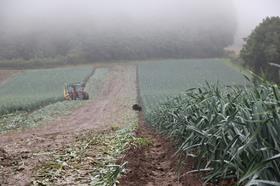
Crashing out of the EU without a deal would leave many food businesses operating in Northern Ireland and the Republic of Ireland with mounting costs and paperwork, with a likely detrimental impact on consumers and public health, food policy experts have warned.
A new briefing, published as part of the Food Research Collaboration’s Food Brexit Briefing series, has argued that a no-deal Brexit would lead to disruption in food supplies across Ireland, due to the introduction of border controls on foods entering Ireland from the UK, with the Republic of Ireland legally obliged to impose controls on the Irish side of the border.
The briefing warns that price hikes and restricted supply are likely to impact fruit and vegetables the most, at a time when the public is being urged to eat more fresh produce.
Authors of the study urged the UK government to recognise the importance of food flows between Northern and the Republic of Ireland and recommended that a no-deal Brexit must be averted; that effective government and governance in NI be put in place before 31 October; and that financial support be made available to Local Authorities in Northern Ireland to cope with the impacts on consumers and businesses.
Dr Rosalind Sharpe from the Food Research Collaboration said: 'Since the Good Friday Agreement, the food sectors on both sides of the border have quietly integrated. Farms and food businesses, from the giant to the micro, depend on being able to ship goods easily across the border. A no-deal Brexit pulls the rug from under them. Some could go out of business within days.'
Incapacity to cope
The study gave the example of a sandwich maker producing five different types of sandwiches containing animal products - such as butter, cheese, fish or meat - and shipping them to 20 outlets across the border on a daily basis, which would mean 100 certificates every day. That is because foods containing constituents of animal origin will need to be accompanied by an Export Health Certificate, filled in by the exporter and authorised and countersigned by a vet or an Environmental Health Officer, who would in turn need to inspect the goods physically to verify compliance.
Neither small food businesses affected nor the public organisations involved, be it local councils or the Department of Agriculture, Environment and Rural Affairs (DAREA) in Northern Ireland, currently have the capacity and resources to cope with this, the report stressed.
Professor Tim Lang of the Centre for Food Policy added: 'There has been too little attention paid to the impacts a no-deal will have on food flows through the island of Ireland and absolutely zero attention to the impact a no-deal could have on imports of fruit and vegetables into Northern Ireland. These are vitally important. Disruption is a risk to public health and must be avoided'.



